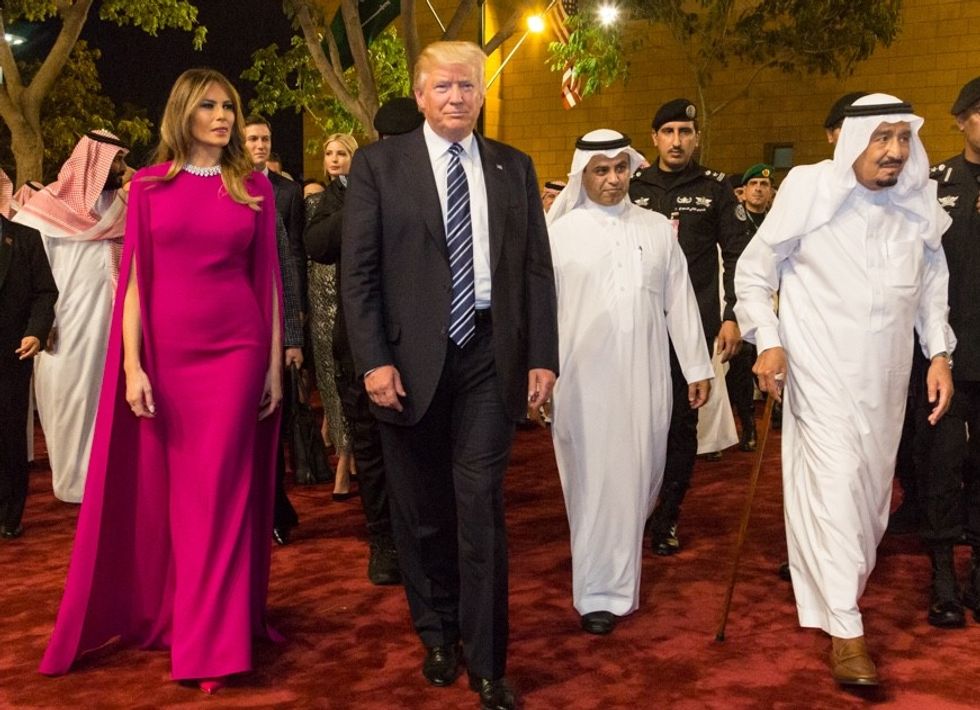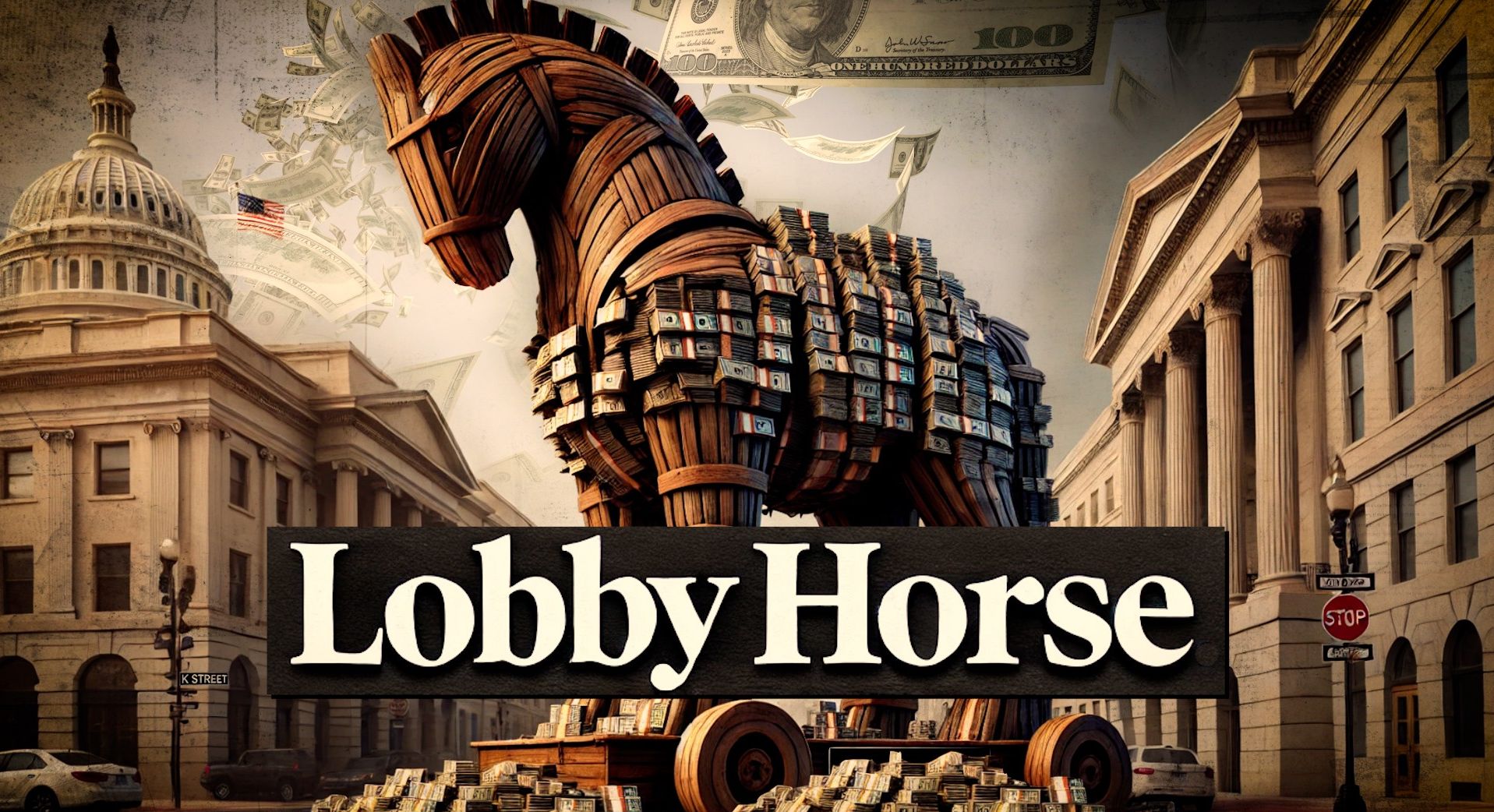Next week President Trump will take his first international state trip as president and, just as in his first term, the Kingdom of Saudi Arabia will be his first stop. Trump hasn’t minced words about why he’s heading there: money.
“I said I'll go if you pay $1 trillion to American companies — meaning the purchase over a four-year period of $1 trillion — and they've agreed to do that,” Trump told reporters on March 7, when he first announced that he’d visit the Kingdom.
No Saudi official has confirmed that any such agreement was made, and there’s reason to be skeptical of the amount given Trump’s penchant for exaggeration and the fact that $1 trillion is more than the value of the entire Saudi sovereign wealth fund.
While it’s unclear how much money is actually at stake and who will get it, there’s one person that is certain to cash in on Saudi Arabia’s financial largesse: Donald Trump. For years up until the present day, in fact, billions of dollars in Saudi money have been quietly flowing to companies owned by the president, his family, and others in Trump’s orbit. And, U.S. national security might be paying the price.
Saudi Arabia’s courtship of Trump began before he even took office in 2017. At a 2015 rally in his run for president, Trump explained that, “Saudi Arabia — and I get along great with all of them. They buy apartments from me. They spend $40 million, $50 million. Am I supposed to dislike them? I like them very much.”
After Trump was elected in 2016, his son-in-law Jared Kushner quickly formed a bromance with Mohammed bin-Salman (MBS), then-Saudi Minister of Defense. That bond would ultimately prove extraordinarily profitable for Kushner and politically advantageous for MBS. Kushner was allegedly responsible for convincing Trump to make Saudi Arabia the destination of his first foreign trip abroad as president, where Trump was lavished with all manner of luxury, including “a multimillion-dollar gala in his honor, complete with a throne-like seat for the president,” according to the Washington Post.
The Saudis also gave Trump the opportunity to pose as an international deal-maker, agreeing to hundreds of billions of dollars in investments in U.S. companies, including a wildly exaggerated $110 billion arms sale.

President Donald Trump and First Lady Melania Trump arrive to the Murabba Palace, escorted by King Salman bin Abdulaziz Al Saud of Saudi Arabia, May 20, 2017, in Riyadh, Saudi Arabia, to attend a banquet in their honor. (Official White House Photo by Shealah Craighead)
A month after Trump’s visit, MBS orchestrated a palace coup — including detaining and torturing political rivals — that yielded him the title of Crown Prince and de facto ruler of Saudi Arabia. When Trump heard the news, he reportedly told Kushner that, “we’ve put our man on top.”
Even after MBS received international condemnation for ordering the brutal murder of Washington Post contributor Jamal Khashoggi at the Saudi consulate in Turkey, Trump stood right by MBS’s side. “I saved his ass,” Trump told investigative reporter Bob Woodward, adding, “I was able to get Congress to leave him alone. I was able to get them to stop.”
In the more than six years since Khashoggi’s murder, the Saudis have showered Trump and his family's businesses with cash. Kushner’s private equity firm Affinity Partners, received a staggering $2 billion from the Saudi’s Public Investment Fund (PIF), which is ultimately controlled by MBS, just six months after Trump left office in 2021. Analysts at the sovereign wealth fund questioned numerous aspects of the investment, including, “the inexperience of the Affinity Fund management,” and the firm’s operations being, “unsatisfactory in all aspects,” according to the the New York Times. MBS, nonetheless, approved the deal days later. Trump’s former Treasury Secretary Steven Mnuchin’s Liberty Strategic Capital, also received a $1 billion investment from the Saudi’s PIF.
With Trump’s reelection, Saudi money has once again begun pouring into Trump-world. In December, less than a month after Trump won the 2024 presidential election, the Trump organization announced it was leasing its brand to two new projects in Saudi Arabia. In early April, the Saudi PIF-owned LIV Golf Tour — that has attempted something of a hostile takeover of the American owned PGA Tour — held a tournament with a $25 million prize pool at Trump’s National Doral Golf Club that Trump himself attended. This is despite a two year investigation of PIF by the Senate’s Permanent Subcommittee on Investigations Minority Staff Report finding that PIF is spearheading a sportswashing effort by Saudi Arabia and that LIV and “the PIF’s investment in the PGA Tour does not make business sense unless it is an effort to buy long-term influence.”
Just last week, the Trump Organization announced a deal to build “Trump International Golf Club Simaisma [Qatar],” in collaboration with a private Saudi company, Dar Global, that has close ties to the Saudi regime. The project includes “a luxury 18-hole golf course, golf club and an exclusive collection of Trump-branded luxury villas,” according to the press release. Dar Global is also working with the Trump Organization to build a Trump tower in Dubai, in the United Arab Emirates (UAE). Also last week, at a conference in the UAE, a founder of the Trump family crypto firm, World Liberty Financial, announced that the firm’s digital coin would be used by the Emirati government backed firm MGX to invest $2 billion in the crypto exchange Binance. In 2023 Binance and its CEO pled guilty to accusations that the platform was used for sanctions violations and money laundering.
Trump has announced that he will visit both the UAE and Qatar after visiting Saudi Arabia, where is expected to announce a $100 billion arms sales package to the Kingdom while also urging Congress to limit oversight on such sales.
This is despite the Saudi regime having repeatedly used U.S. weapons in attacks that have killed civilians, even bombing weddings and school buses. Heinous attacks like these with U.S. weapons contribute to a phenomenon my colleague Bill Hartung has noted: U.S. weapons sales typically do more to fuel conflict than stability.
In sum, Trump’s first state trip abroad during his second term will also be a tour of his glaring conflicts of interest. But U.S. taxpayers will be left footing the bill, both financially and in their security.
- How Saudi Arabia went from pariah to patron ›
- No Joke: US considering nuclear power for Saudi in grand bargain ›
- Weapons industry cheers as Trump inks Saudi $142B arms deal | Responsible Statecraft ›
- US foreign policy is for sale with $TRUMP meme coin | Responsible Statecraft ›
- Trump doesn't need to buy Saudi loyalty with a security pact | Responsible Statecraft ›
- Trump courts Saudi at the risk of US, Middle East security | Responsible Statecraft ›
- Board of Peace will be a bonanza for wealthy board members ›
















